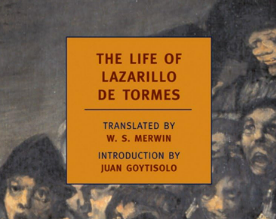To The Reader
byTo The Reader, this opening note is not just a formality but a pointed defense of truth against the spread of fantasy. The writer, J. de Luna, steps forward not only as a storyteller but as a witness determined to restore dignity to a tale that has, in his eyes, been twisted into nonsense. A version of Lazarillo’s life, recently printed and circulated, told of him falling into the sea and transforming into a fish—a tuna no less—complete with underwater battles, a scaly wife, and tuna offspring. To accept such a tale would be to accept mockery in place of memory. De Luna, offended by the absurdity, is determined to set the record straight. Not because he loathes fiction, but because this fiction intrudes on a story too human to be handled with such carelessness.
He explains that his narrative is not born from whim or imagination but from records kept in the rogues’ archives of Toledo. These writings, tucked away and long forgotten, came into his hands as if fate wanted to reclaim Lazarillo’s truth. Alongside these pages, de Luna recalls how the story of Lazarillo had always lingered in his childhood home—passed between family members over warm meals, debated with earnest laughter and serious nods. He mentions a particular memory where his relatives argued about the possibility of surviving underwater for long periods, referencing a passage from this very account. It was an old swimmer, lean and sharp-eyed, who once assured them that such feats were possible. According to him, a man from the region had entered a hidden cave beneath the Tagus River and emerged the next day, unharmed and unaware of the grief he had caused.
These recollections, though shaped by time, lend a weight to de Luna’s conviction. He does not claim to erase every exaggeration, but he promises not to invent where invention would insult experience. His version, he says, holds closer to fact, to those strange truths that hover just outside the border of the believable. He believes readers deserve more than whimsy—they deserve a Lazarillo shaped by hardship, cunning, and real consequence. With this, he asks not just for attention, but for patience. He knows that the truth does not glitter as brightly as fantasy, but it endures more deeply. In a world filled with distraction, de Luna offers this version not as a perfect record, but as the most faithful one he can find.
As he draws the reader closer, de Luna shifts from formal apology to an invitation. He promises moments of laughter, discomfort, and recognition—all framed by a voice that speaks from the margins of society, yet touches its very center. The Lazarillo he presents is not a hero, not a fish, but a man who stumbled often and survived even more. The story, drawn from both ink and memory, weaves together what was written and what was whispered, shaping a narrative that reflects both fact and the shadows that facts leave behind. To read on is to step into a life marked by misfortune and irony, told not with grandeur, but with grit.
He also reminds the reader that myths, while entertaining, can become dangerous when they replace understanding. The bizarre tale of fish battles and underwater kingdoms may amuse, but it drowns the real voice of Lazarillo—the one that still matters. Through this correction, de Luna gives Lazarillo back to those who need his story most: the forgotten, the underestimated, the observers at the edges. This is a book for those who know what it means to endure without applause. For readers tired of polished lies, he offers something sharper, stranger, and—most importantly—true.
De Luna’s message is not just literary housekeeping; it is a plea for clarity in a world crowded with noise. In a time when every version of a story seems equally valid, he asks us to pause and consider the cost of that belief. If every lie is as welcome as the truth, then how does a real life survive? Lazarillo’s tale is not one of magic, but of maneuvering. And to understand it properly is to recognize not just the cleverness of one man, but the resilience buried in everyday survival. That, de Luna believes, is the story worth reading.

